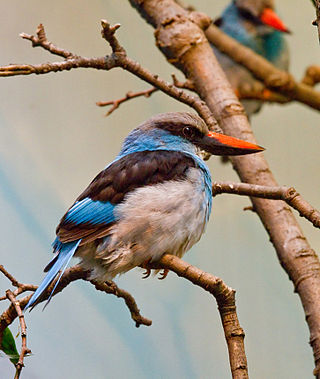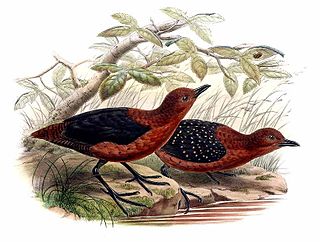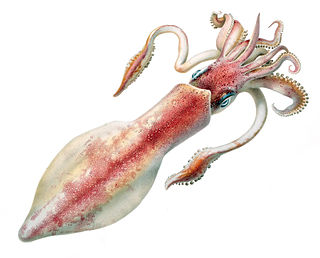
The blue-breasted kingfisher is a tree kingfisher widely distributed across Equatorial Africa. This kingfisher is essentially resident, but retreats from drier savanna areas to wetter habitats in the dry season.

The white-collared kite is an Endangered species of bird in tribe Pernini and subfamily Perninae of family Accipitridae, the diurnal raptors. It is endemic to northeastern Brazil.

The Chatham parakeet, also known as Forbes' parakeet, is a rare parakeet endemic to the Chatham Islands group, New Zealand. This parakeet is one of New Zealand's rarest birds and is classified as Vulnerable on the IUCN Red List, as a result of a range of threats to the species survival, including habitat loss, predation, and hybridization. A number of conservation methods have been employed to assist the recovery of this species, and currently the population trend is considered stable.
The greater tree mouse is a species of rodent in the family Muridae. It is found only in Papua New Guinea.

Forbes's forest rail or Forbes's forest crake, is a species of bird in the family Sarothruridae. It is found in New Guinea. Its natural habitats are subtropical or tropical moist lowland forest and subtropical or tropical moist montane forest.

The Apurímac brushfinch or Apurimac brushfinch is a species of bird in the family Passerellidae.

The painted ringtail possum or moss-forest ringtail possum is a species of marsupial in the family Pseudocheiridae. It inhabits montane forests between altitudes of 450 to 3800 metres throughout the Huon Peninsula montane rain forests, Central Range montane rain forests and Huon Peninsula montane rain forests of Papua New Guinea. It has a diet of primarily leaves, including those of Medinilla.
Amastra forbesi was a species of gastropod in the Amastridae family. It was endemic to Hawaii.

Loligo forbesii, known commonly as the veined squid and long-finned squid, is a commercially important species of squid in the family Loliginidae, the pencil squids.

The masked ringtail possum is a marsupial possum of the family Pseudocheiridae. It is found in northeastern New Guinea in the Star Mountains. the eastern Central Cordillera, the Huon Peninsula and the northern coast ranges. Masked ringtails are arboreal residents of various forest ecosystems. They are sexually dimorphic and locally common. This species is sometimes classified as a subpopulation of P. forbesi; however, it has a separate range.

The Barrens darter is a species of freshwater ray-finned fish, a darter from the subfamily Etheostomatinae, part of the family Percidae, which also contains the perches, ruffes and pikeperches. It is endemic to the eastern United States, where it is only known from the Cumberland ecoregion. It inhabits generally quiet pools in headwaters and creeks, often sheltering underneath large rocks. This species can reach a standard length of 7.4 cm (2.9 in). This species forms part of the Etheostoma squamiceps species complex within the subgenus Catonotus and it is further part of the "blackfin darter" group. It was first formally described in 1992 by Lawrence M. Page and Patrick A. Ceas with its type locality given as Duke Creek which is 3.2 kilometres (2.0 mi) southeast of Hollow Springs in Cannon County, Tennessee. The specific name honours Stephen A. Forbes, who was a noted ichthyologist member of the Illinois Natural History Survey during the early part of the 20th century.

Asterias forbesi, commonly known as Forbes sea star, is a species of starfish in the family Asteriidae. It is found in shallow waters in the northwest Atlantic Ocean and the Caribbean Sea.
Scopula forbesi is a moth of the family Geometridae first described by Herbert Druce in 1884. It is found in Cameroon and Nigeria.
The D'Entrecasteaux Archipelago pogonomys, also known as the D'Entrecasteaux Archipelago tree mouse, is a species of prehensile-tailed rat from the family Muridae that is endemic to Papua New Guinea. It was once considered to be a subspecies of the Large Tree Mouse. Deforestation is posing a threat to the species, but it has been suspected that the species has some degree of tolerance towards disturbance of its habitat.
Dysschema forbesi is a moth of the family Erebidae first described by Herbert Druce in 1907. It is found in Brazil.

Pterolophia is a genus of longhorn beetles of the subfamily Lamiinae, containing the following species:
Rothschildia forbesi, the Forbes' silkmoth, is a species of silkmoth in the family Saturniidae.
Aspitates forbesi is a species of geometrid moth in the family Geometridae. It is found in North America.
Sphenomorphus forbesi, also known commonly as Forbes' forest skink and the slender litter skink, is a species of lizard in the family Scincidae. The species is endemic to Papua New Guinea.

Oecanthus forbesi, the Forbes' tree cricket, is a species of tree cricket in the family Gryllidae. It is found in North America.











